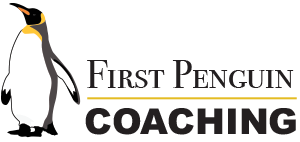I asked a career change client last week how he felt about reaching out to contacts whom he didn’t know. He responded, “Cold opens are hard for me.” He was not comfortable with this process and commented that he wasn’t a “hunter”.
Sometimes, it’s hard to understand how others struggle with the networking part of the job search. Having spent 14+ years in sales and having researched various career paths, I am a hunter. I love exploring opportunities, meeting new people, and building relationships. It’s a skill that I’ve practiced for many years, I’ve seen the process work, and I continue to use it.
NETWORKING IS ESSENTIAL for those looking for work and those wanting to make a career change. According to HubSpot, 85% of job positions are filled through networking. In 2021, TopResume found that 75% of resumes are rejected by ATS before the hiring manager even sees them! Although there is a chance that reactively applying to postings will result in an interview; these statistics show that networking is the best way to find a job.
How can job searchers overcome their fear of networking?
Reframe how you think about networking. This word gets a bad rap, but it really is about relationship building. Consider yourself an explorer vs. a hunter. Substitute informational meetings for networking. Think of it as a process to gather information and to build relationships, which will help you make confident, informed decisions allowing you to move forward with your career change.
Believe that you have value. Networking isn’t just about “getting” information, contacts, or opportunities. You have experience and knowledge that others do not. What you know might be valuable to someone else. Even if you are unemployed, you have something to offer. You might be in a position someday to help the person that agrees to help you.
Set networking micro goals, so that the networking process doesn’t seem overwhelming. For example, the goal could be to connect with three professionals on LinkedIn per day. Or, you could aim to schedule two informational meetings per week. Whatever goals you decide, they should be attainable and realistic for what you can accomplish.
Prepare. “Luck is what happens when preparation meets opportunity.” Plan what you are going to say before you type a message or make a phone call. Here is a framework that you can use before connecting via e-mail, LinkedIn, or by phone:
- Who you are and referral name, if applicable
- Why you are making contact… “I’m interested in xyz field / role, and I understand you have a lot of experience in this space. I’d appreciate ___ minutes of your time, so that I can learn more about this path”.
- Propose specific dates/times and ask if they are available to meet (depending on geography and your comfort level) with you in person, phone, or Zoom.
Know that most people want to help you especially if you communicate effectively your interest in their role or industry. If they are an accomplished professional in their space, someone most likely helped them along the way. Occasionally, you might not hear back from someone, but don’t take it personally. You never know what that person is going through, or if they received the message.
Which brings me to my next tip: Network beyond LinkedIn. Some contacts aren’t active on LinkedIn, so you may never get a response or not in a timely fashion. How else can you connect? Check out professional association websites and the board member contact information. These people are typically leaders in their fields and passionate about the work that they do. You can also check company websites and social media profiles for alternate ways to reach people.
Lastly, understand that networking is a skill that you can develop. The more that you practice it, the better you will get.
If you want to learn more about how networking can benefit your career, reach out to me here to schedule a time to talk: gina@firstpenguincoaching.com
